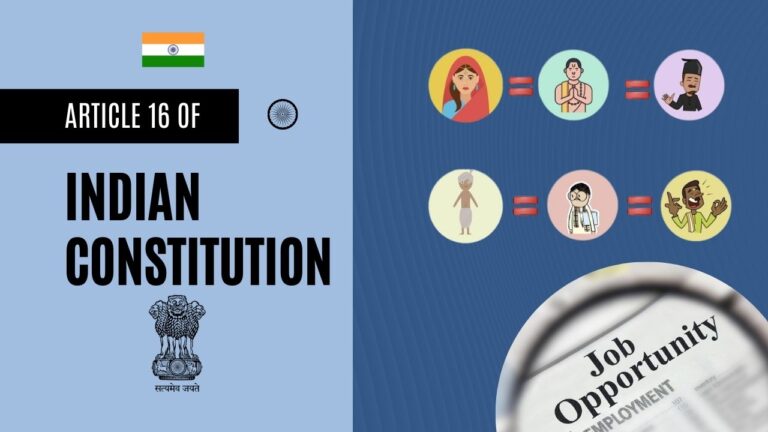Article 344 of Indian Constitution: Commission and Committee of Parliament on official language
Article 344 of Indian Constitution
Original Text
(1) The President shall, at the expiration of five years from the commencement of this Constitution and thereafter at the expiration of ten years from such commencement, by order constitute a Commission which shall consist of a Chairman and such other members representing the different languages specified in the Eighth Schedule as the President may appoint, and the order shall define the procedure to be followed by the Commission.
(2) It shall be the duty of the Commission to make recommendations to the President as to—
- the progressive use of the Hindi language for the official purposes of the Union;
- restrictions on the use of the English language for all or any of the official purposes of the Union;
- the language to be used for all or any of the purposes mentioned in article 348;
- the form of numerals to be used for any one or more specified purposes of the Union;
- any other matter referred to the Commission by the President as regards the official language of the Union and the language for communication between the Union and a State or between one State and another and their use.
(3) In making their recommendations under clause (2), the Commission shall have due regard to the industrial, cultural and scientific advancement of India, and the just claims and the interests of persons belonging to the non-Hindi speaking areas in regard to the public services.
(4) There shall be constituted a Committee consisting of thirty members, of whom twenty shall be members of the House of the People and ten shall be members of the Council of States to be elected respectively by the members of the House of the People and the members of the Council of States in accordance with the system of proportional representation by means of the single transferable vote.
(5) It shall be the duty of the Committee to examine the recommendations of the Commission constituted under clause (1) and to report to the President their opinion thereon.
(6) Notwithstanding anything in article 343, the President may, after consideration of the report referred to in clause (5), issue directions in accordance with the whole or any part of that report.
Article 344 of Indian Constitution Explanation:
Article 344 of Indian Constitution has provided for the creation of a commission for the progressive adoption of Hindi for the official purposes. However, as we know according to the 2011 Census only 43.63% of the Indian population can speak Hindi. During the formation of Indian Constitution, the situation was similar.
In this context, eighth schedule was created with a list of language which would be provided certain protection, despite the adoption of Hindi:
- The members representing the speakers of different languages of the eighth schedule would be a part of the committee, that is to be constituted under the provisions of Article 344 of Indian Constitution.
- It will protect the interests of non-Hindi speaking groups, as well as have due regard to the industrial, cultural and scientific advancement of India.
- Further, article 351 of Indian Constitution states that in order to promote the adoption of Hindi, its vocabulary must be enhanced using Sanskrit and other languages; and enrichment could be done by adoption of forms, genus and styles of the eighth schedule language as well as Hindustani.
A few other provisions have also been made in the Part XVII of the Indian constitution to protect the interests of the speakers of different languages:
- Any person can use any language to address any public officer of the Union or the state to redress any grievance, under Article 350.
- Article 350A makes it obligatory over the State to create facilities for instruction in the mother tongue at primary stage of education.
- Until the adoption of Hindi is possible, English will be used for all official purposes such as in the proceedings of the higher judiciary, for the formulation of all bills, acts, orders, rules, regulations and bye-laws.
- Authorised Translation (Central Laws) Act, 1973 provides that when a central law is translated to a regional language and published in the official gazette, the regional language translation will be deemed to be the authorized translation.
Note 1: The Languages mentioned in the Eighth schedule are neither Official language, nor national language and nor the state languages. These are just a list of languages which are given certain special protection as discussed above.
Note 2: Even though, English is used for the official purposes it is not the official language of India. According to article 343, Hindi, written in Devanagari script (and Roman form of Indian numeral), is the official language of the Indian union. Officially, the Indian constitution was translated to Hindi in 1950. It was made into an authoritative text through the insertion of Article 394A in 1987 via 58th Constitutional amendment act.
| Official Language of the Union | Hindi |
| Official Language of the States | One or more language can be decided by the states |
| Language used for court/official purposes | English |
Note 3: States can have their own official language Official language (including Hindi or English). However, until the state assembly passes such a law, English shall be continued to be used as the official language.
Note 4: For inter-state and centre-state communication too, English would be used, unless two or more state agree to use Hindi or some other language to be used for communication.
For Further Reference:
Read the Constitution of India.
Also read the special officer for linguistic minorities article.

